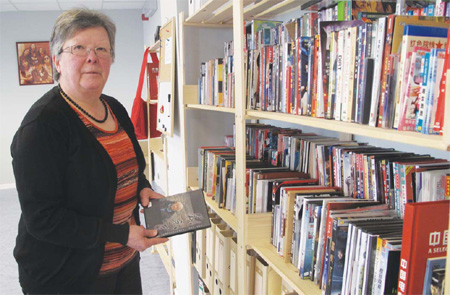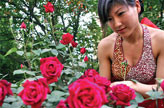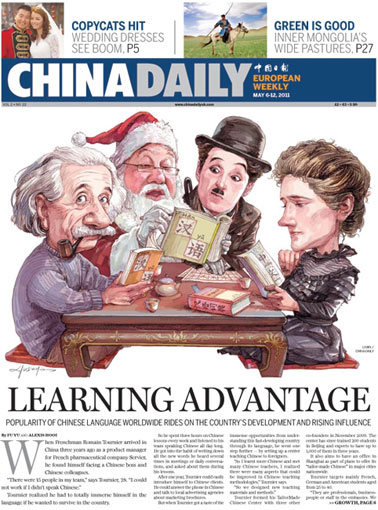Movie magic
Updated: 2011-03-25 10:29
By Fu Jing (China Daily European Weekly)
Promoting Chinese films has become a lifelong passion for a Belgian massage therapist
Brigitte de la Royere was once grabbed by one of China's top film stars, Siqin Gaowa, and literally dragged away, all the while jabbering in her native Mongolian language. When Siqin finally realized Royere wasn't responding to her words, she looked up and saw that she had grabbed the wrong person.
 |
|
Brigitte de la Royere works at the Royal Belgium Film Archive, |
That rather strange encounter was the start of a close friendship between Siqin and Royere, a 64-year-old Belgian massage therapist. Moreover, that added to Royere's growing love for Chinese films and culture - something that began shortly after China's opening up in 1978.
That passion for Chinese films has resulted in Royere becoming the unofficial curator of more than 2,500 Chinese films, numerous movie posters and documents at the Royal Belgium Film Archive in Brussels.
The films and items have come from the Chinese embassy, her personal collection and donations from the daughter of a late friend, Regis Bergeron, a French connoisseur of the Chinese cinema.
Every week for three half days, Royere is at the archive, talking to moviegoers, researchers and students interested in Chinese film studies.
"This is not work but pleasure," Royere says. "Watching films and discovering things are not hard work."
Every week, she sends out newsletters and updates the archive's website to announce the latest movies. Last month, she invited cinemagoers to watch a new film, Let the Bullets Fly, directed by her friend and director Jiang Wen.
"Even if there is only one person requesting to watch a Chinese film in my office, I will accompany him/her here," says Royere.
Ironically, Royere, who became interested in China and its culture when she was very young, never even thought of visiting China until she met two "normal" Europeans who were among the first people from Europe to visit the country after it opened up in 1978.
She uses the word "normal" because before the opening up, only businessmen and those from the Belgium Communist Party could visit China. "They were 'normal' because they had no business or political connection to their visit," she says.
At that time, Royere had just graduated from university and was working as a therapist. "It is quite new for us to learn that those 'normal' people have visited China and we always thought it was impossible," she says.
But she was told it was very easy to visit China as the country had just opened its door and expected more overseas visits.
"I immediately bought the flight tickets and joined a group of Europeans," says Royere, adding that she possibly was the second group of "normal" Europeans to visit China.
On Sept 28, 1978, Royere began her intensive trip to China, visiting Beijing, Hong Kong, Xi'an, Nanjing and even a model village of Dazhai in North China's Shanxi province. The visit came as a true cultural shock as both Europeans and Chinese were "eager and curious" to know each other.
As Europeans, they were used to recognizing a person's social status and background by the way they dressed. But this was nearly impossible to do in China then as nearly everyone dressed in same styles and colors. "That was interesting," says Royere.
For her, 1978 was like the moment the Chinese people awoke after 10 years of the "cultural revolution" (1966-1976). The Europeans even met young college students who had just returned from "being re-educated" in the countryside, who urgently crammed themselves with knowledge. "They are real people and shared with interesting stories," says Royere.
Shortly after returning to Brussels, she linked up with the Belgium-China Association and obtained permission to watch some Chinese films, which were being kept in a storage room. But she soon found that it was boring to watch film alone.
By the early 1980s, with more foreigners visiting China, she invited them to share their experiences of China by showing slides to members of the association. More and more foreigners were keen to share what they had experienced and learnt, and Royere was instrumental in organizing such activities for five years.
Royere also learnt that the Chinese embassy in Brussels had many films, most of which were not cataloged. With the help of a friend, she spent two years and cataloged the films, which including at least 400 feature movies.
"That was really a good way to learn Chinese culture," she says, adding that she was reading Chinese film magazines at the same time.
E-paper

War of the roses
European Chinese rose growers are beating their Chinese rivals at their own game
High-tech park gets big boost
At the source
Merchant of Venice
Specials

Sino-US Dialogue
China and the US hold the third round of the Strategic and Economic Dialogue on May 9-10 in Washington.

Drunk driving
Drunk drivers face a detention for one to six months and a revokation of their drivers' license.

V-Day parade
A military parade marking the 66th anniversary of the Soviet victory over Nazi.
